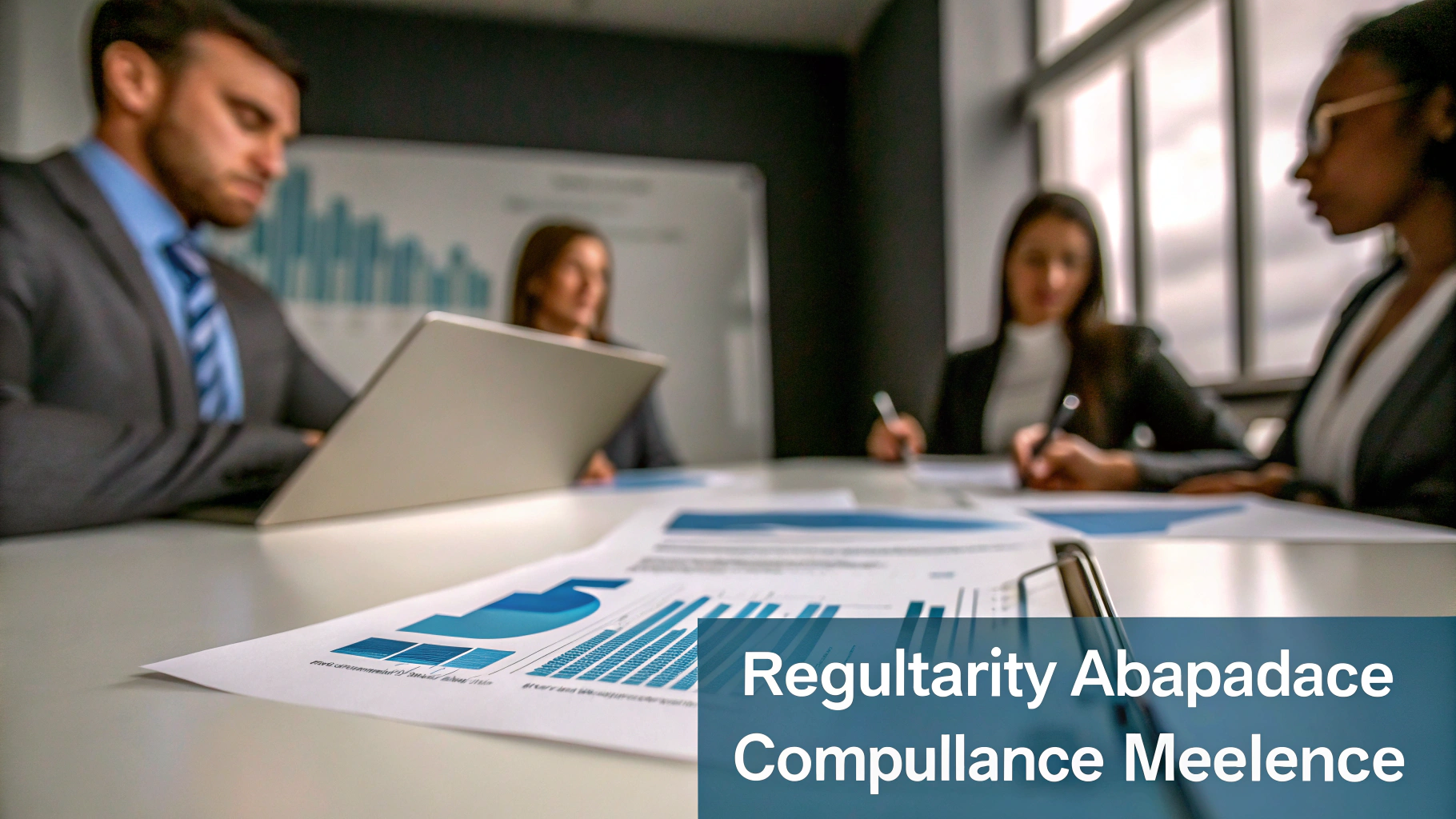Master Regulatory Compliance in Pharmaceutical Industry: A Step-by-Step Guide

Introduction
Navigating the labyrinth of regulatory compliance in the pharmaceutical industry is not merely a legal necessity; it’s a vital element for ensuring patient safety and product efficacy. As regulations evolve, organizations must proactively stay ahead of compliance requirements to avoid severe repercussions, such as hefty fines and a loss of market trust. This guide presents a comprehensive, step-by-step approach to mastering regulatory compliance, empowering pharmaceutical companies to enhance their operational integrity while safeguarding public health.
How can organizations effectively streamline their compliance processes to thrive in this complex environment? By understanding the challenges and implementing robust solutions, companies can not only meet regulatory demands but also foster a culture of compliance that benefits all stakeholders.
Consider the success stories of organizations that have effectively navigated compliance hurdles. These case studies illustrate that with the right strategies, compliance can be transformed from a daunting task into a competitive advantage.
In this guide, we will explore actionable insights and proven methodologies that can help your organization excel in regulatory compliance, ensuring that you remain at the forefront of the industry while prioritizing patient safety.
Understand Pharmaceutical Regulatory Compliance
Regulatory compliance in the pharmaceutical industry is crucial for ensuring adherence to the laws, guidelines, and specifications that govern the development, manufacturing, and marketing of pharmaceutical products. Understanding these regulations is the first step towards ensuring regulatory compliance in the pharmaceutical industry. Key regulations include:
- Good Manufacturing Practices (GMP): Essential practices that guarantee products are consistently produced and controlled according to quality standards.
- ISO Standards: International benchmarks that ensure quality, safety, and efficiency in products, services, and systems.
- Quality System Regulations (QSR): Regulations that oversee the quality management systems of medical devices and drugs.
It is vital to familiarize yourself with the specific requirements related to regulatory compliance in the pharmaceutical industry that apply to your organization and the products you handle. AVS Life Sciences offers comprehensive adherence solutions tailored to meet these regulatory demands. By leveraging innovative technologies like artificial intelligence, we enhance regulatory compliance in the pharmaceutical industry and streamline adherence procedures.
Are you ready to elevate your compliance strategy? Engage with AVS Life Sciences today to explore how our expertise can help you navigate the regulatory landscape effectively.
Recognize the Importance of Compliance
Adherence in the drug industry is vital for regulatory compliance in the pharmaceutical industry, as it goes beyond mere legal obligation and is essential for safeguarding patient safety and ensuring product efficacy. The significance of compliance can be distilled into several key areas:
- Patient Safety: Adhering to stringent safety standards is crucial for protecting patients from potential harm. Ensuring regulatory compliance in the pharmaceutical industry with Good Manufacturing Practices (GMP) significantly reduces the risk of contamination and defects, thereby guaranteeing that pharmaceutical products consistently meet safety benchmarks.
- Regulatory compliance in the pharmaceutical industry is often a prerequisite for obtaining market authorization from agencies such as the FDA and EMA. Firms that demonstrate strong adherence to regulations are better equipped to navigate the complexities of regulatory compliance in the pharmaceutical industry.
- Organizations recognized for their commitment to regulatory compliance in the pharmaceutical industry foster trust among consumers and stakeholders. This trust is vital for maintaining a competitive edge in a crowded marketplace.
- The financial implications of non-compliance in the regulatory compliance in pharmaceutical industry can lead to severe repercussions, including hefty fines, product recalls, and diminished market share. For instance, major pharmaceutical firms have faced penalties totaling billions due to violations related to pricing, off-label marketing, and GMP non-adherence. Such financial burdens often far exceed the initial investments needed for regulatory compliance in the pharmaceutical industry, highlighting the importance of proactive compliance with standards.
By acknowledging these essential elements, organizations can cultivate a culture of adherence that prioritizes quality and safety, ultimately enhancing their operational integrity and market standing. Are you ready to take the necessary steps towards compliance excellence?

Follow a Step-by-Step Compliance Process
To ensure regulatory compliance in the pharmaceutical industry, effectively navigating the complexities of legal requirements is crucial. Here are essential steps to guide your organization:
-
Conduct a Regulatory Assessment: Start by evaluating your current adherence status against key regulations like Good Manufacturing Practices (GMP), ISO standards, and Quality System Regulations (QSR). Identify gaps and areas for improvement to lay a solid foundation for your compliance efforts.
-
Develop a Regulatory Plan: Craft a comprehensive regulatory plan that outlines how your organization will meet legal requirements. This plan should detail timelines, responsibilities, and the resources necessary for implementing effective changes.
-
Implement Training Programs: It’s vital that all employees receive training on regulatory policies and procedures. Regular training sessions are essential for maintaining awareness and understanding of regulatory requirements, fostering a culture of continuous improvement.
-
Establish Monitoring Mechanisms: Implement robust systems to continuously oversee adherence. This includes conducting routine audits, inspections, and evaluations of processes and documentation to ensure compliance with established criteria.
-
Document Everything: Keep thorough documentation of all regulatory efforts, including training records, audit results, and corrective actions taken. This documentation is crucial for demonstrating adherence during inspections and audits, reinforcing your commitment to regulatory standards.
-
Review and Update Regularly: Recognize that compliance is an ongoing process. Consistently review and revise your adherence plan to reflect changes in regulations and industry standards, ensuring your organization remains aligned with best practices and evolving demands.
By following these steps, organizations can effectively manage the intricacies of legal requirements, enhancing operational efficiency and ensuring regulatory compliance in the pharmaceutical industry. Are you ready to elevate your compliance strategy? Engage with AVS Life Sciences to explore tailored solutions that meet your needs.

Utilize Tools and Resources for Compliance
To strengthen your compliance efforts, consider integrating the following tools and resources:
-
Compliance Management Software: Solutions like MasterControl and VComply automate compliance processes, manage documentation, and track regulatory changes, significantly enhancing operational efficiency. The Healthcare Compliance Software Market, valued at USD 3.14 billion in 2024, is projected to reach USD 7.82 billion by 2032. This growth reflects the increasing reliance on such tools in the industry.
-
Document Management Systems (DMS): A robust DMS streamlines the storage and retrieval of compliance-related documents, ensuring that all records are easily accessible and up-to-date. Organizations using DMS have reported enhanced adherence results, decreasing the time spent on document retrieval and ensuring conformity to regulatory standards.
-
Training Platforms: Online training platforms support continuous education for employees, ensuring they stay updated on regulatory requirements. Consistent training is vital, as it enables staff to make informed choices regarding regulations, thereby promoting a culture of integrity within the organization.
-
Governance Intelligence Services: These services provide prompt updates on legislative changes and trends, assisting organizations in remaining proactive regarding adherence requirements. By utilizing these insights, companies can adjust their adherence strategies to align with evolving regulations.
-
Consulting Services: Collaborating with regulatory specialists offers customized advice and assistance, especially in navigating intricate legal frameworks. Expert suggestions emphasize the importance of a thorough regulatory program that includes organized policies and routine audits to ensure continual adherence.
By leveraging these tools and resources, organizations can significantly enhance their capabilities for regulatory compliance in the pharmaceutical industry, streamline processes, and reduce the risk of non-compliance. This ultimately supports their strategic objectives in the pharmaceutical industry.
Conclusion
Mastering regulatory compliance in the pharmaceutical industry is not just important; it’s essential for organizations that want to guarantee product safety, efficacy, and market success. Understanding the intricate web of regulations—like Good Manufacturing Practices (GMP), ISO Standards, and Quality System Regulations (QSR)—allows companies to build a solid compliance foundation. This foundation not only meets legal obligations but also fosters trust and integrity in their operations.
To achieve compliance, organizations must adopt key strategies:
- Conducting thorough regulatory assessments is crucial.
- Developing comprehensive plans that address potential challenges.
- Employee training is another vital component, ensuring that everyone is equipped with the knowledge they need.
- Utilizing advanced tools and resources can streamline compliance efforts.
Each of these steps plays a significant role in maintaining adherence to regulations and mitigating the risks associated with non-compliance, which can lead to severe financial and reputational damage.
The importance of regulatory compliance in the pharmaceutical industry cannot be overstated. It’s a critical factor that influences patient safety, market access, and organizational reputation. By prioritizing compliance and leveraging available resources, pharmaceutical companies can successfully navigate the complex regulatory landscape. This ensures they not only meet current standards but also adapt to future changes. Engaging with experts and utilizing innovative technologies empowers organizations to cultivate a robust compliance culture that drives long-term success and enhances public trust.
Frequently Asked Questions
Why is regulatory compliance important in the pharmaceutical industry?
Regulatory compliance is crucial for ensuring adherence to laws, guidelines, and specifications that govern the development, manufacturing, and marketing of pharmaceutical products.
What are Good Manufacturing Practices (GMP)?
Good Manufacturing Practices (GMP) are essential practices that guarantee pharmaceutical products are consistently produced and controlled according to quality standards.
What role do ISO Standards play in pharmaceutical compliance?
ISO Standards are international benchmarks that ensure quality, safety, and efficiency in products, services, and systems within the pharmaceutical industry.
What are Quality System Regulations (QSR)?
Quality System Regulations (QSR) oversee the quality management systems of medical devices and drugs, ensuring they meet regulatory standards.
How can organizations ensure they meet regulatory compliance requirements?
Organizations should familiarize themselves with the specific regulatory compliance requirements that apply to their operations and the products they handle.
How does AVS Life Sciences assist with regulatory compliance?
AVS Life Sciences offers comprehensive adherence solutions tailored to meet regulatory demands and leverages innovative technologies like artificial intelligence to enhance compliance and streamline procedures.
